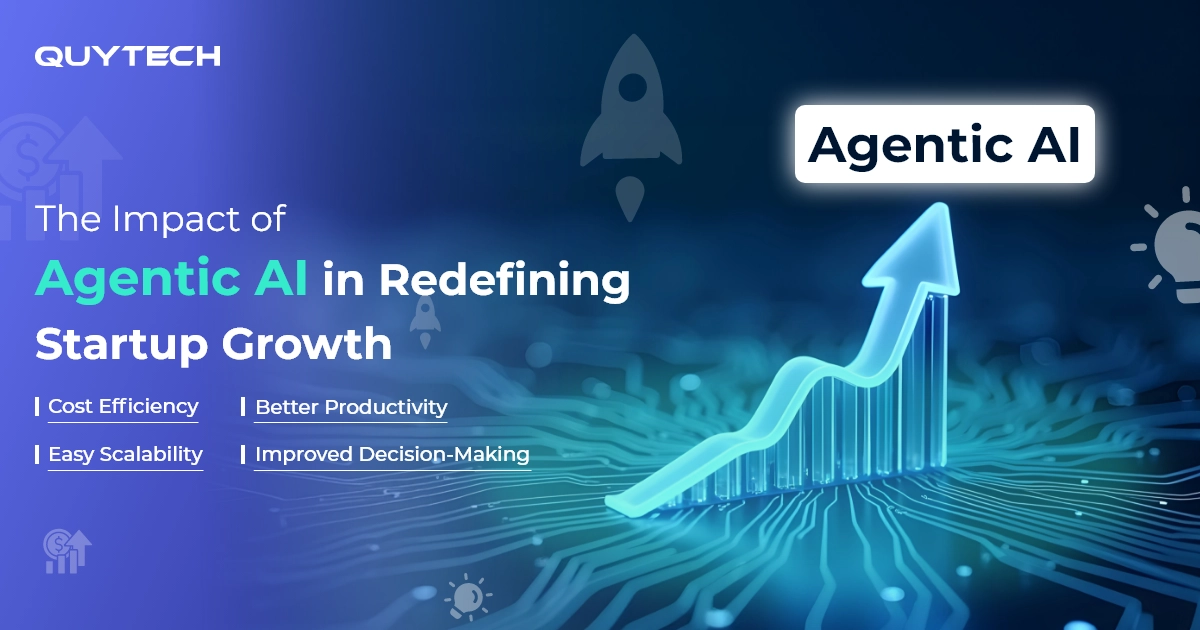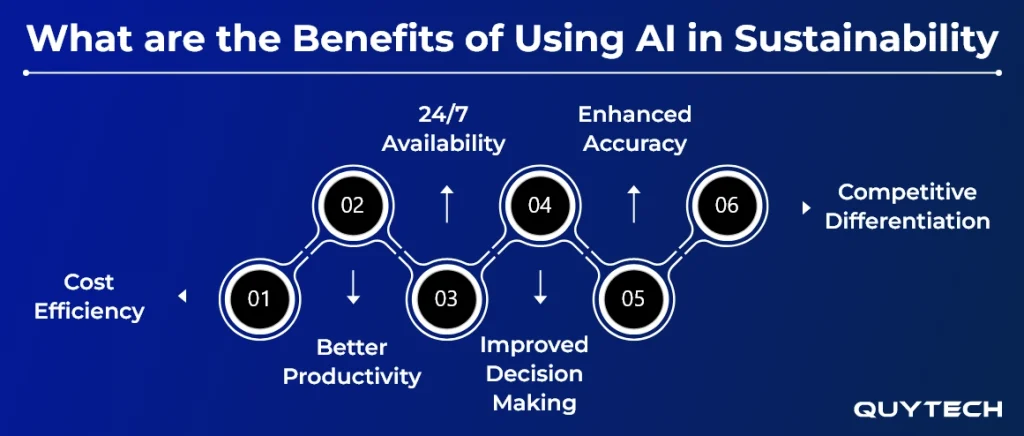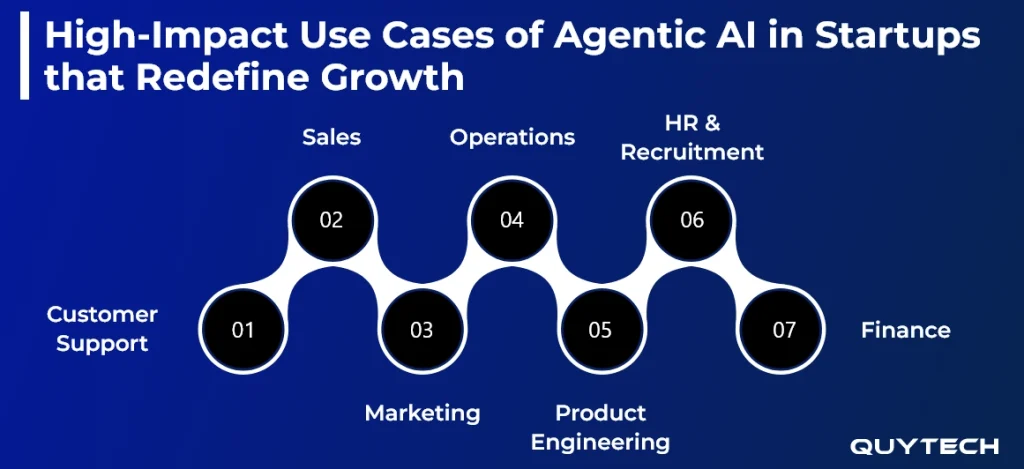Key Takeaways:
- Agentic AI refers to systems designed for autonomous, goal-oriented task automation, with continuous learning and adaptability.
- Agentic AI for startups contributes to improving operational, resource allocation, decision-making, and scalability areas.
- The benefits of implementing agentic AI in startups include enhanced productivity, cost savings, 24/7 availability, and accuracy.
- Agentic AI for startups works by identifying the goal, deriving context, creating action plans, executing tasks, and monitoring outcomes.
- Agentic AI’s future trends for startups include ultra-lean teams, hyper-personalization, and on-device agents.
Imagine a technology so transformative that it’s expected to grow with a CAGR of 42.80% every year. Curious to know the name? It’s none other than ‘Agentic AI’. Agentic AI has significantly helped various sectors achieve growth prospects, and startups are no exception.
With its ability to bring transformation by introducing automation, autonomy, and goal-oriented actions, agentic AI is redefining how startups grow. It helps in enhancing efficiency, saving costs, improving decision-making, and scaling smartly. But how does one technology deliver so much impact across a startup?
If that’s what you’re curious about, then you are at the right place. This blog will help you understand the concept and role of agentic AI in redefining startup growth. So, read till the end and find the answers to all your curiosities.
Understanding Agentic AI
Agentic AI is an artificial intelligence system capable of performing tasks autonomously. It consists of multiple agents working together to accomplish a common goal. Agentic AI can understand assigned tasks, create action plans, and execute them independently.
If compared with traditional AI, you will notice that automation is more of a rule-based task. It’s like a user giving instructions and traditional AI carrying them out with a pre-trained method. If it encounters any hurdles while performing the task, it waits for human intervention to guide the way forward. But with agentic AI, the game shifts seamlessly!
Unlike traditional AI, agentic AI is not bound by rigid working directions; it features adaptability. In simple words, agentic AI can alter action plans as and when needed. Not just that, agentic AI has contextual awareness, which helps in understanding a situation and acting accordingly. What’s more is that agentic AI improves its performance from every interaction and output it gives.
Why Agentic AI Has Become Essential for Startups
Agentic AI in startups plays a very crucial role. It contributes to improving everything from resource management to decision-making processes. But how does it contribute to operations directly? Read this section and find out for yourself:
Operational Inefficiencies
Operational inefficiencies represent a very common hurdle that hinders startups from performing to their potential. These are usually a result of undefined tracking and task management practices. This unstructured task management makes it hard to identify efforts promptly.
Agentic AI for startups automates tracking of workflows. It monitors all the operations, identifies delays, and creates an action plan to tackle the delays. All of these tasks are carried out in real-time.
Resource Constraints
Another challenge that binds startups from developing further is resource constraints. While running a startup requires the same resources, budget constraints often make it hard to invest more in hiring staff. This impacts the growth of a startup and also increases employee burnout.
Agentic AI allows startups to get their work done without hiring more employees. It is capable of performing tasks in different domains. This helps startups establish automated and autonomous departments without increasing headcount.
Slow Decision-Making
As mentioned above, processes carried out in startups are not effectively tracked. This leads to data fragmentation and siloes. With this data quality, analysis becomes slow, and human bias and intuitions also end up becoming a part of the decision-making process.
However, with agentic AI for startups, the decision-making process not only becomes faster but also accurate. Agentic AI is capable of analyzing large amounts of data in real-time. This allows it to understand context, plan decisions, and act on them without human dependency.
Competitive and Dynamic Environment
The environment where startups operate is very dynamic. The trends and shifts in this environment are so sudden that traditional strategies are not able to keep pace with them. By the time somebody notices and plans for a trend, the market has already moved on to the next.
But with agentic AI, startups get the wings to not just cope with but lead the market trends. Agentic AI continuously analyzes market data, including customer interactions, preferences, competitors, future demand, etc. And with adaptability at its core, agentic AI helps startups cope with trends with ease.
Scalability Constraints
Scalability constraints arise when startups enter a growth phase. In such times, handling resources efficiently becomes challenging. This is usually because tasks multiply, data increases, but the resources do not multiply at the same speed.
Agentic AI for startups makes use of a mult-agent architecture. This allows them to handle multiple tasks and large data volumes without compromising the quality of the processes. Hence, with agentic AI, scaling becomes easy for startups.
Interesting Read: Agentic AI in Education: The Future of Personalized and Adaptive Learning

How Does an Agentic AI in Startups Work?
To understand how agentic AI in startups is driving growth-oriented transformation, the first step is to understand how it works. Here’s a breakdown of the working mechanism of agentic AI for startups:
Goal Identification
The primary step of the working mechanism begins with goal identification. Here, the task is assigned to agentic AI by the operator. After receiving a command, agentic AI interprets it and turns it into a clear goal so it knows exactly what it needs to do.
Context Derivation
Once the task is fed in, the next step is to understand the context of the goal. In this step, agentic AI starts gathering information relevant to the task assigned. This helps it gain contextual understanding of the task and act as needed.
Action Plan Creation
After understanding the context, agentic AI for startups starts creating an action plan. It breaks the main task into smaller units, assigns them to different agents, and creates a workflow. These workflows add flexibility, allowing tasks to be completed even if one agent fails.
Task Execution
Once agentic AI creates an action plan, the next step includes its execution. It follows the workflow and hierarchy of tasks created in the plans. In case of any hurdles, agentic AI works on adjusting the action plan to complete tasks on time.
Outcome Monitoring & Improvement Cycle
After executing the action plan, agentic AI monitors its outcomes. It compares the actual outcome to the planned one to look for deviations. This helps agentic AI in interpreting the outcomes for the human operators via dashboards and similar tools. Along with this, outcome monitoring helps agentic AI review its performance and improve it.
You Might Also Like: Revolutionizing Insurance Underwriting with Agentic AI
Key Benefits of Implementing Agentic AI in Startups
Now that you are familiar with the working mechanism of agentic AI, let’s guide you through the benefits of implementing agentic AI in startups. The benefits include cost savings, better productivity, 24/7 availability, and much more. Here’s a dedicated section explaining the benefits in detail:
Cost Efficiency
Implementing agentic AI in startups helps in cutting costs. Unlike traditional AI systems, which automate but depend on human operators, agentic AI works autonomously. This allows startups to direct their workforce in other strategic tasks and eliminates the need for hiring system supervisors, naturally saving costs.
Better Productivity
With agentic AI implemented in workflows, startups can enhance their overall productivity. Agentic AI automates repetitive and time-consuming tasks, which allows teams to direct their efforts to higher-level tasks. Hence, the tasks that earlier required a team are now automated and faster, adding to the productivity.
24/7 Availability
Implementing agentic AI in startups provides 24/7 uninterrupted work availability. Since agentic AI does not depend on an operator to function, it does not get tired or need breaks. It works even when teams are offline or unavailable.
Improved Decision-Making
Integrating agentic AI for startups improves the decision-making process. Unlike traditional systems, the decision-making process is more dependent on manual analysis and intuition. But with agentic AI, decision-making becomes smarter, efficient, and effective as it is data-driven.
Enhanced Accuracy
Agentic AI for startups introduces better accuracy while performing operations. As you know already, agentic AI operates on its own, without depending on human operators. This eliminates human error, adding to better accuracy throughout the operations.
Competitive Differentiation
Implementing agentic AI in startups gives them a competitive advantage. It does not just signify tech adoption ability but also helps startups grow smoothly. It makes achieving objectives like scalability without having to invest heavily in hiring and other resources. Also, agentic AI helps startups adapt to dynamic environments, adding to the competitive advantage.
Recommended Next: How to Build an AI Copilot for Enterprises
High-Impact Use Cases of Agentic AI in Startups that Redefine Growth
Understanding the implementation and role of any technology without knowing its applications can be quite challenging. But not anymore! Here’s a list of the use cases of agentic AI in startups contributing to growth prospects:
Customer Support
In customer support, agentic AI plays its role by automatically handling customer queries. Being contextually aware, agentic AI can understand customer doubts and resolve them by offering solutions autonomously.
Sales
Agentic AI in sales assists by automating lead qualification processes. Along with this, it can carry out repetitive and engagement-maintaining tasks like sending follow-up emails, messages, etc. What’s more is that agentic AI can also offer insights based on the data of the leads.
Marketing
In marketing, agentic AI for startups contributes by generating basic content like captions, descriptions, etc. It can create and track campaigns and offer insights to reflect their effectiveness and points of improvement.
Operations
In operations, agentic AI for startups plays its role by tracking and assigning workflows. It can analyze and predict demand fluctuation patterns and suggest practices to enhance preparedness. It automates reporting through dashboards, making it easy to assess operational effectiveness.
Product Engineering
In product development, agentic AI helps in finding bugs and suggesting fixes. Along with this, it assists in automating repetitive coding tasks. Agentic AI can also assist with the testing stage in product engineering.
HR & Recruitment
In HR and recruitment, agentic AI plays its role by screening resumes after matching them with job descriptions. It can also assist the HR department by automating interview schedules. Agentic AI handles the onboarding process, like document collection and analysis, to maintain employee records.
Finance
In the field of finance, agentic AI contributes to automating bookkeeping for maintaining a record of transactions. It can also analyze and flag unusual transactions, preventing fraud. Agentic AI in finance adds speed to tasks and eliminates human error.
Explore More: Top 20 AI Agent Development Companies
The Future of Startup Growth with Agentic AI
Agentic AI for startups is not a time-based trend; it’s a wave of transformation that will introduce more such revolutionary technologies. In simple words, agentic AI for startups is expected to expand and grow to introduce trends like ultra-lean teams, hyper-personalization, and on-device agents. Let’s dive deeper into the future of startup growth with agentic AI:
Ultra-Lean Teams
The future growth trends hold ultra-lean teams for agentic AI for startups. This will allow startups to create core operational teams without having to hire a large team. Hiring fewer people to handle strategic and decisional operations and letting agentic AI handle recurring ones will allow startups to achieve growth objectives while utilizing resources efficiently.
Hyper-Personalization
As it’s already known that agentic AI is self-learning and improving, the future will emphasize hyper-personalization. This will contribute to better customer retention, enhanced startup operations, and functionality of the agentic AI itself.
On-Device Agents
The wave of future trends includes the introduction of on-device agents. These will shift agentic AI access from cloud-based systems to on-device. It will make agents accessible on phones, wearables, etc. Along with this, it will also contribute to better data privacy.
Why Startups Trust Quytech for Agentic AI Innovation
With startups needing faster execution, leaner teams, and improved decision-making, the first step is selecting the right agentic AI development company. This is where Quytech comes into play. With industry-wide experience and expertise in developing agentic AI solutions, Quytech stands as a reliable partner.
By uniting skilled teams with technologies such as LLMs and orchestration frameworks, we deliver tailored solutions catering to client needs. Powered by expertise and innovation, we emphasize delivering quality solutions with transparency at every step of development. With scalability at the core, our solutions empower startups to grow smoothly and sustainably.
Conclusion
With competition at its peak, startups that adopt agentic AI will stand ahead. Agentic AI implementation will assist them in enhancing their operational efficiency and rising even wth resource constraints. Its varied use cases give startups a chance to tap into adopting smart departments and keep up with the dynamic environment.
What’s more is that it benefits startups in multiple ways. It helps them save costs, enhance accuracy in operations, make informed decisions, and gain a competitive edge. Additionally, it provides startups with the ability to get full-fledged functional departments without increasing the headcount. In conclusion, startups adopting agentic AI are the ones leading the future of smart growth.
FAQs
Normal automation is rule-based and depends on human intervention; it is not autonomous. Agentic AI has contextual understanding, which makes it capable of making decisions on its own, hence making it autonomous.
No, agentic AI does not replace a complete department. Instead, it automates repetitive tasks in real-time, which assists the workforce of department in working more efficiently.
No, startups do not need a technical team to implement agentic AI. They can implement agentic AI by partnering with an agentic AI development company or by hiring developers.
Agentic AI reduces the need for hiring full-time roles in fluctuating work areas. This allows startups to scale even with resource constraints.




